|
|
|
Sort Order |
|
|
|
Items / Page
|
|
|
|
|
|
|
| Srl | Item |
| 1 |
ID:
160165
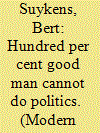

|
|
|
|
|
| Summary/Abstract |
This article seeks to better understand political violence in Bangladesh. Analysing the case of student politics, the article enquires into the productive use of violence by student activists and leaders. It argues that student violence should not be considered as a breakdown of order or a sign of state fragility, but as a means of gaining access to party-state resources and patronage. Violence operates to mark out and maintain power relations between student groups and factions. Risk-taking and the performance of self-sacrifice are important to delineate spaces of power and broker connections to potential political patrons. While actively engaging in political violence provides legitimacy within student hierarchies, victimhood provides a powerful means of publicly displaying one's commitment to a political party. Student public authority, while violent, is closely integrated in national political-party authority structures and, as a result, is intrinsically connected to the Bangladesh party-state. While it might seem counter-intuitive, this article argues that the use of political violence helps one to gain protection from the (party-)state.
|
|
|
|
|
|
|
|
|
|
|
|
|
|
|
|
| 2 |
ID:
097177
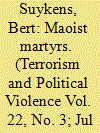

|
|
|
|
|
| Publication |
2010.
|
| Summary/Abstract |
By closely analysing Naxalite propaganda material, I explain the functionality of martyrdom in the Maoist movement in India. I show that their concept of secular martyrdom is multifaceted, but can be traced to a mix of several elements in classical Maoist doctrine (sacrifice, dialectics, and critique). As such, the cult of the secular martyr serves both practical and ideological aims. My analysis, tracing martyrdom to secular ideology, opens new possibilities for studying this type of martyrdom, which has come under pressure in the wake of the 9/11 attacks.
|
|
|
|
|
|
|
|
|
|
|
|
|
|
|
|
| 3 |
ID:
160930
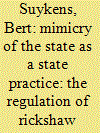

|
|
|
|
|
| Summary/Abstract |
Around half a million cycle rickshaws are currently active in Dhaka, Bangladesh. With only 86,000 official licenses available, different types of organizations supply licenses to most rickshaw drivers. These non-official licenses mimic the language of the state. This article argues that while these licenses appear as part of non-state, hybrid, or twilight institutions, they in fact constitute a state practice. Based on approximately 200 semi-structured interviews at six locations in Dhaka and offering a conceptualization of the Bangladesh state as a party-state, the article shows that the operation of non-official rickshaw licenses and the mimicry entailed is an inherent part of party-state governance, one which is not morally neutral. While most respondents saw the everyday benefits of non-official licenses in the absence of sufficient official ones, the latter remained the most prized and, if made available, respondents agreed that the former would become redundant.
|
|
|
|
|
|
|
|
|
|
|
|
|
|
|
|
| 4 |
ID:
153019
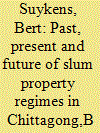

|
|
|
|
|
| Summary/Abstract |
This article argues for the need to take time into account when understanding land ownership in slums. It shows that this allows comprehending more accurately the place of land law and the specific forms that legal struggles over land take. Field research in a slum in Chittagong (in Bangladesh) reveals that while contemporary practices of ownership and transfer might appear to be informal and illegal, they are not only grounded in historical forms of legal land settlement, embedded in a long-standing court battle over legal ownership, but also the product of expectations related to the (legalised) future. Finally, urban planning, with a state-sponsored vision of the future of slums, further complicates the role of the law.
|
|
|
|
|
|
|
|
|
|
|
|
|
|
|
|
| 5 |
ID:
160161
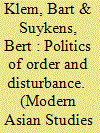

|
|
|
| 6 |
ID:
157193
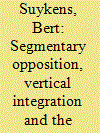

|
|
|
|
|
| Summary/Abstract |
This article aims to conceptualize political relations in Bangladesh by building a descriptive model of these relations. It draws on the concept of segmentary opposition developed by Evans-Pritchard in his study of the Nuer political system and on the concept of vertical integration used in the study of both industrial relations and party structures in federal states. It is argued that the structure of political relations in Bangladesh is based on the interaction of the logic of segmentary opposition and of vertical integration under leader-based groups. The descriptive model is then applied to two cases, based on qualitative fieldwork in Dhaka and Chittagong, to further clarify the model and illustrate its use as an analytical tool.
|
|
|
|
|
|
|
|
|
|
|
|
|
|
|
|
| 7 |
ID:
084227
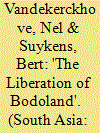

|
|
|
|
|
| Publication |
2008.
|
| Summary/Abstract |
Bodoland, located in western Assam, has been a theatre for insurgencies since the mid 1980s. Too often, migration has been the paradigmatic framework to analyse not only this, but most conflicts, raging in Assam. In this article we argue that migration in itself is insufficient to understand the problems in Bodoland. Instead, we focus on forestry and tea estates, and contend that they, forming important restrictive structures, caused tribal entrapment, finally leading to violence. Moreover, we claim that during the conflict a shift in control over these structures occurred, changing the livelihood arithmetic of the involved communities. Finally, we discuss both the restraints and opportunities of the BTC/BTAD (Bodoland Territorial Council/Bodoland Territorial Administrative District)-the result of the peace process-and warn that the escape from entrapment for the Bodo could lead to the entrapment of other communities in the area.
|
|
|
|
|
|
|
|
|
|
|
|
|
|
|
|
| 8 |
ID:
190161
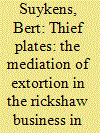

|
|
|
|
|
| Summary/Abstract |
Around half a million rickshaws ply the streets of Dhaka, Bangladesh. To deal with the problem of theft, owner associations started to issue ‘thief plates’. These allow owners to get their rickshaws back at a reduced price. They also offer a protection against theft. This article argues that these plates form material mediators brokering relations between rickshaw owners and drivers, and thieves. Building on the literature on state-citizen brokerage, bureaucratic materialities and Anton Blok’s work on mafia, it wants to highlight the centrality of mediation in understanding practices of protection/extortion. It also aims to contribute to the literature on mafia in South Asia, showing the need to pay attention to norms of non-violence when dealing with violent or criminal strongmen.
|
|
|
|
|
|
|
|
|
|
|
|
|
|
|
|
| 9 |
ID:
090592
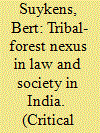

|
|
|
|
|
| Publication |
2009.
|
| Summary/Abstract |
This article examines two conflicting narratives concerning the relationship between tribals and forests in India-narratives that have been counterpoised in India at least since colonial times. The first narrative sees tribals as the natural protectors of the forest; the second argues that tribal practices are detrimental to forest conservation. The author investigates how these two representations of Indian tribals have shaped and are still shaping legal and societal relations between tribals and forests. The author shows how these narratives are deeply embedded in Indian forest legislation and how local officials, rights activists, and tribals themselves all make selective use of the two narratives to gain or deny access to forest resources.
|
|
|
|
|
|
|
|
|
|
|
|
|
|
|
|
|
|
|
|
|